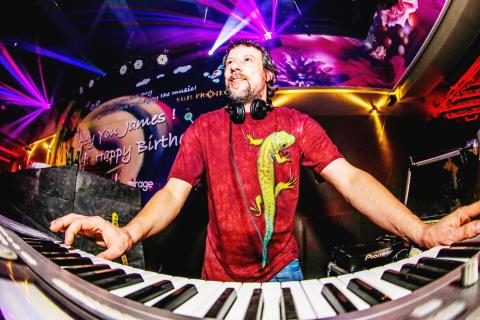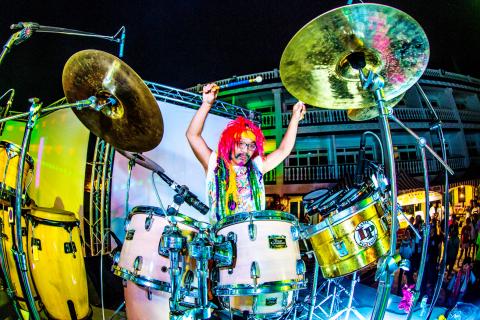Every summer, I sit in my air-conditioned flat and scour the Internet for mind-blowing DJ gigs and one-of-a-kind parties happening in Taipei. But sometimes Taiwan can seem to be so far from the center of the festival circuit. Think Coachella. Think Glastonbury.
Some of us have gotten used to this festival envy that usually comes accompanied by feelings of resentment toward living somewhere so far off the grid that most popular DJs still confuse it with Thailand. Others make the pilgrimage to Japan for Fuji Rock.
Fortunately, though not at all on the scale that our neighbor to the north organizes festivals, there are a few creative promoters in Taiwan. One of these festivals is happening this upcoming weekend, One Love Dancingfest 2014: Love From The Sky.

Photo courtesy of One Love
But don’t worry if it all sounds too bohemian for you, it’s as much for hippies as Coachella is (which is not at all, they’re only playing dress up).
One Love is a small outdoor festival with a big heart. In its third year, the 16-hour event takes place on a private beach on Taiwan’s north coast. David Lin (林大為), one of the organizers, says the festival features music, art, performance, dancing, blue skies and sandy beaches.
A series of geometric art installations have been built for One Love around the stage, bar and tent area. Painting, busking, fire spinning, LED mapping and other visual arts will also be on display.

Photo courtesy of One Love
Lin says he got the inspiration for the festival from Lightning in a Bottle, an American festival whose mantra promotes sustainability, social cohesion, health and creative expression. He hopes that by instilling the same values and interactive activities, he can awaken Taiwan and prepare it for something bigger in the future.
Last year, 2,500 people showed up for the event.
Proximity to coast should award partygoers with a spectacular sunset as it has in previous years and according to Lin, is the most beautiful sunrise on the north coast.
■ One Love DancingFest begins tomorrow at 2pm and runs until Sunday morning at 6:30am at the White House Resort (白宮行館), 264 Masu Rd, New Taipei City (新北市瑪鋉路264號). Presale tickets are available at all iBon/FamiPorts for NT$1,000, or NT$1,300 at the venue. On the web: www.facebook.com/events/283069635208774/

That US assistance was a model for Taiwan’s spectacular development success was early recognized by policymakers and analysts. In a report to the US Congress for the fiscal year 1962, former President John F. Kennedy noted Taiwan’s “rapid economic growth,” was “producing a substantial net gain in living.” Kennedy had a stake in Taiwan’s achievements and the US’ official development assistance (ODA) in general: In September 1961, his entreaty to make the 1960s a “decade of development,” and an accompanying proposal for dedicated legislation to this end, had been formalized by congressional passage of the Foreign Assistance Act. Two

Despite the intense sunshine, we were hardly breaking a sweat as we cruised along the flat, dedicated bike lane, well protected from the heat by a canopy of trees. The electric assist on the bikes likely made a difference, too. Far removed from the bustle and noise of the Taichung traffic, we admired the serene rural scenery, making our way over rivers, alongside rice paddies and through pear orchards. Our route for the day covered two bike paths that connect in Fengyuan District (豐原) and are best done together. The Hou-Feng Bike Path (后豐鐵馬道) runs southward from Houli District (后里) while the

March 31 to April 6 On May 13, 1950, National Taiwan University Hospital otolaryngologist Su You-peng (蘇友鵬) was summoned to the director’s office. He thought someone had complained about him practicing the violin at night, but when he entered the room, he knew something was terribly wrong. He saw several burly men who appeared to be government secret agents, and three other resident doctors: internist Hsu Chiang (許強), dermatologist Hu Pao-chen (胡寶珍) and ophthalmologist Hu Hsin-lin (胡鑫麟). They were handcuffed, herded onto two jeeps and taken to the Secrecy Bureau (保密局) for questioning. Su was still in his doctor’s robes at

Mirror mirror on the wall, what’s the fairest Disney live-action remake of them all? Wait, mirror. Hold on a second. Maybe choosing from the likes of Alice in Wonderland (2010), Mulan (2020) and The Lion King (2019) isn’t such a good idea. Mirror, on second thought, what’s on Netflix? Even the most devoted fans would have to acknowledge that these have not been the most illustrious illustrations of Disney magic. At their best (Pete’s Dragon? Cinderella?) they breathe life into old classics that could use a little updating. At their worst, well, blue Will Smith. Given the rapacious rate of remakes in modern